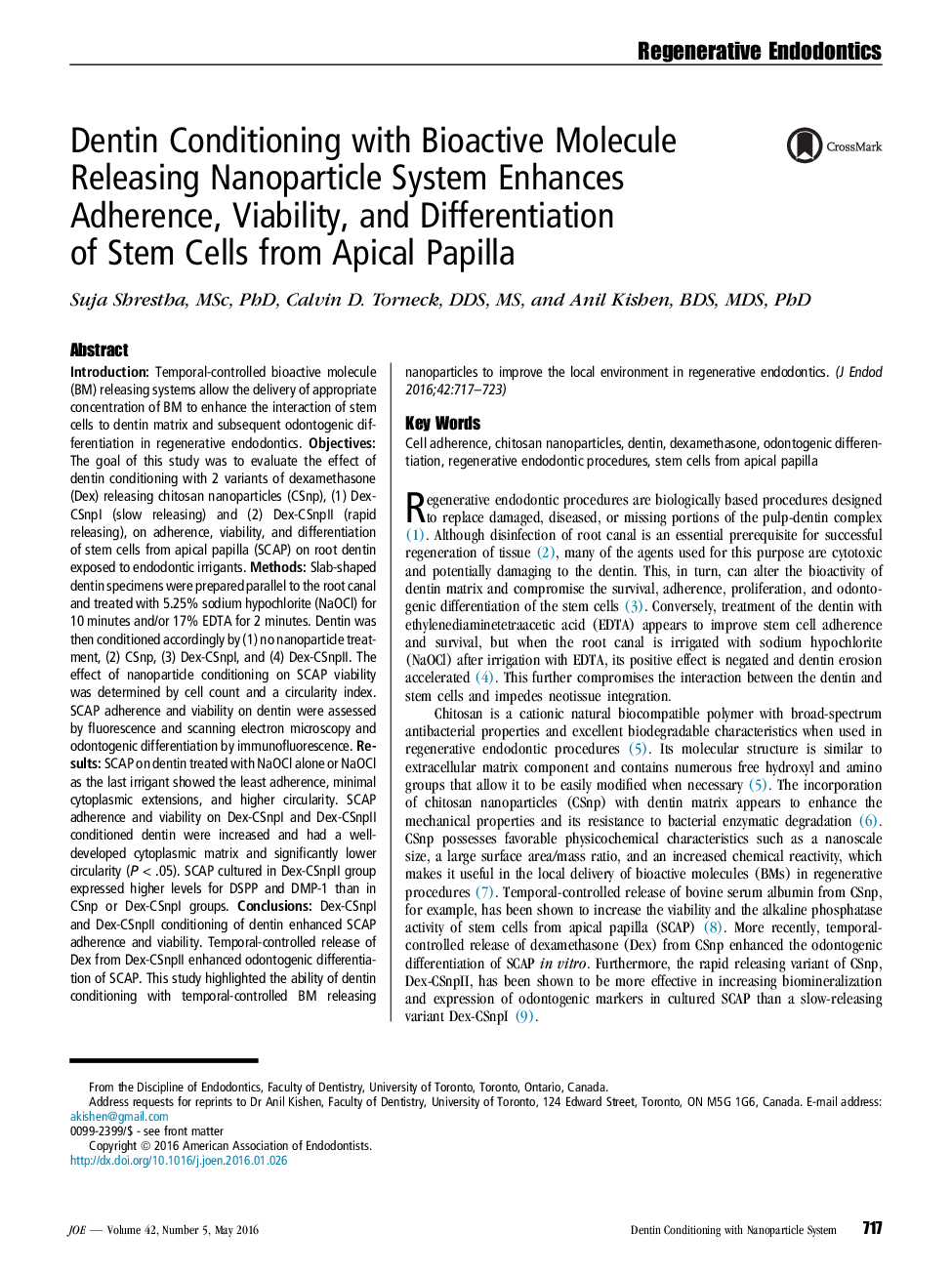| کد مقاله | کد نشریه | سال انتشار | مقاله انگلیسی | نسخه تمام متن |
|---|---|---|---|---|
| 3147794 | 1197377 | 2016 | 7 صفحه PDF | دانلود رایگان |
• This study highlights the potential of dentin conditioning with temporal-controlled dexamethasone releasing chitosan nanoparticle system (Dex-CSnp).
• Conditioning of dentin with Dex-CSnp reversed the deleterious effects caused by endodontic irrigants on dentin.
• Dentin conditioning with Dex-CSnp enhanced odontogenic differentiation potential of SCAP.
• The proposed bioactive nanopolymeric system can be used for dentin conditioning to achieve spatial and temporal control in regenerative endodontics.
IntroductionTemporal-controlled bioactive molecule (BM) releasing systems allow the delivery of appropriate concentration of BM to enhance the interaction of stem cells to dentin matrix and subsequent odontogenic differentiation in regenerative endodontics.ObjectivesThe goal of this study was to evaluate the effect of dentin conditioning with 2 variants of dexamethasone (Dex) releasing chitosan nanoparticles (CSnp), (1) Dex-CSnpI (slow releasing) and (2) Dex-CSnpII (rapid releasing), on adherence, viability, and differentiation of stem cells from apical papilla (SCAP) on root dentin exposed to endodontic irrigants.MethodsSlab-shaped dentin specimens were prepared parallel to the root canal and treated with 5.25% sodium hypochlorite (NaOCl) for 10 minutes and/or 17% EDTA for 2 minutes. Dentin was then conditioned accordingly by (1) no nanoparticle treatment, (2) CSnp, (3) Dex-CSnpI, and (4) Dex-CSnpII. The effect of nanoparticle conditioning on SCAP viability was determined by cell count and a circularity index. SCAP adherence and viability on dentin were assessed by fluorescence and scanning electron microscopy and odontogenic differentiation by immunofluorescence.ResultsSCAP on dentin treated with NaOCl alone or NaOCl as the last irrigant showed the least adherence, minimal cytoplasmic extensions, and higher circularity. SCAP adherence and viability on Dex-CSnpI and Dex-CSnpII conditioned dentin were increased and had a well-developed cytoplasmic matrix and significantly lower circularity (P < .05). SCAP cultured in Dex-CSnpII group expressed higher levels for DSPP and DMP-1 than in CSnp or Dex-CSnpI groups.ConclusionsDex-CSnpI and Dex-CSnpII conditioning of dentin enhanced SCAP adherence and viability. Temporal-controlled release of Dex from Dex-CSnpII enhanced odontogenic differentiation of SCAP. This study highlighted the ability of dentin conditioning with temporal-controlled BM releasing nanoparticles to improve the local environment in regenerative endodontics.
Journal: Journal of Endodontics - Volume 42, Issue 5, May 2016, Pages 717–723
